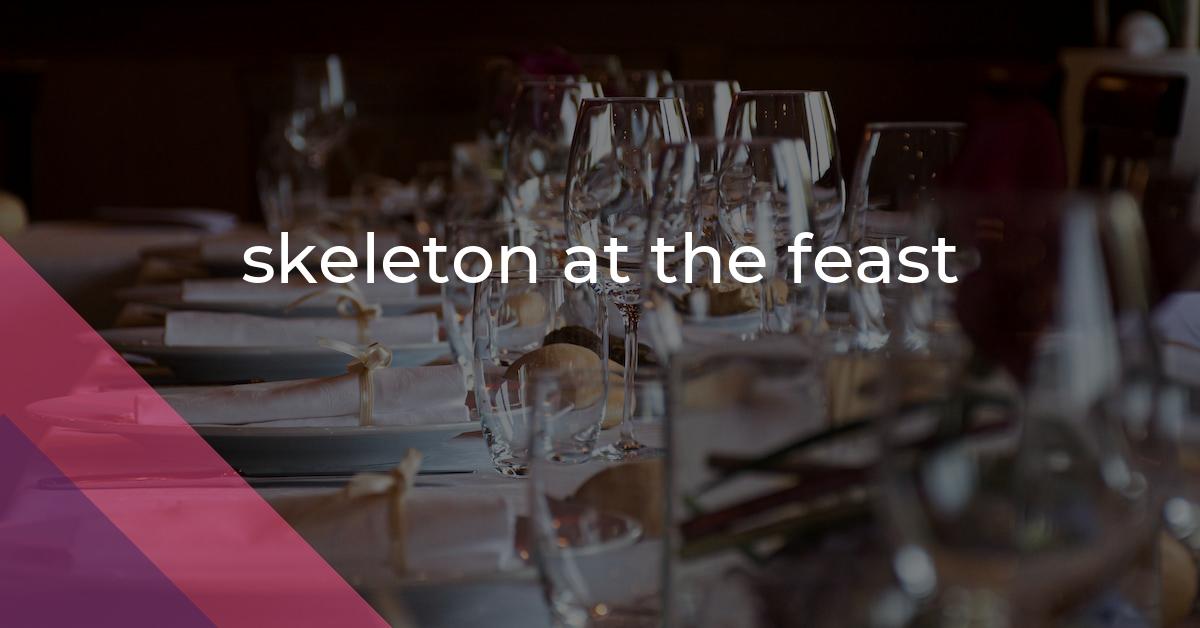skeleton at the feast: Idiom Meaning and Origin
What does ‘skeleton at the feast’ mean?
The idiom skeleton at the feast means an unwelcome or unpleasant person or thing that spoils the enjoyment or mood of a gathering or celebration.

Idiom Explorer
The idiom "the joke is on someone" means that someone has played a prank or trick on another person, resulting in the second person becoming the object of ridicule or mockery.
The idiom "table scrap" refers to a small amount or portion of food left over after a meal, typically given to a pet or thrown away. It symbolizes something of low value or significance, often used figuratively to describe meager or insufficient offerings.
The idiom "stick the knife in" means to purposely say or do something to harm or betray someone, usually when they are already in a vulnerable or difficult situation.
Stick in someone's craw means to annoy or irritate someone, causing them to feel offended or resentful.
An idiom meaning to betray someone or deceive them dishonestly, often when they least expect it.
The idiom "spoil someone rotten" means to excessively pamper or indulge someone, often resulting in them becoming spoiled or having a sense of entitlement.
The idiom "spoil somebody rotten" means to give someone excessive amounts of praise, attention, or material possessions, to the point that it has a negative impact on their behavior or character.
Unwelcome Revelers
The idiom "skeleton at the feast" is an expression used to describe an unwelcome or disturbing element in an otherwise joyful or celebratory situation. It suggests that even during a time of happiness or jubilation, there is an underlying sense of unease due to the presence of something unpleasant.
The origin and history of this idiom are uncertain. However, it is believed to have its roots in ancient feasts where people would place a skeleton at the table. This served as a reminder of death and mortality, emphasizing the impermanence of life and the fleeting nature of joy.
Over time, the phrase "skeleton at the feast" took on a metaphorical meaning. It became a way to describe any unsettling presence or element in an otherwise joyous setting. This idiom is often used to convey a sense of tension or discomfort, highlighting the contrast between the apparent happiness of a situation and the underlying unease caused by something negative.
In modern usage, the idiom is employed in various contexts such as literature, film, and everyday conversation. It is used to describe situations where a negative or troubling element disrupts an otherwise festive atmosphere. For example, someone might say "The argument between the couple was like a skeleton at the feast, spoiling the mood of the whole party."
The idiom "skeleton at the feast" is a vivid expression that effectively captures the idea of a disturbing presence amidst joy and celebration. It conveys the fragile nature of happiness and serves as a reminder that even in the most joyful moments, something unsettling may be lurking beneath the surface.
The idiom "ghost at the feast" is a similar expression used to describe an unwelcome or unsettling presence in a joyful or celebratory situation. Like the skeleton at the feast, it conveys a sense of tension or unease, suggesting that something negative is detracting from the overall atmosphere. While the specific origins and usage of this idiom are not well-documented, it is frequently used in literature, film, and everyday conversation to describe situations where an unwanted presence dampens the mood or disrupts the enjoyment of an otherwise joyful occasion.
The idiom "skeleton in the closet" is another related expression. It is used to describe a secret or shameful fact about someone that they would prefer to keep hidden. The image of a skeleton in the closet emphasizes the idea of secrets or hidden flaws that may be revealed and cause embarrassment or discomfort. This idiom is often used figuratively to refer to any hidden or undisclosed information or problem that could potentially damage a person's reputation or relationships.
Similarly, the idiom "skeleton in the cupboard" refers to a secret or embarrassing fact that someone would prefer to keep hidden. While the meaning is similar to "skeleton in the closet", the use of "cupboard" instead of "closet" suggests a more lighthearted or informal tone. Both idioms convey the idea of hidden secrets or problems that may have negative consequences if revealed.
Lastly, the idiom "skin and bones" is not directly related to the previous idioms, but it does use the word "skeleton" to convey a different meaning. This expression is used to describe someone who is extremely thin or emaciated, often due to illness or lack of proper nutrition. It emphasizes the idea of a person's physical appearance being reduced to just skin and bones, highlighting the severity of their thinness or malnourishment.
Example usage
1. Despite the lively atmosphere at the party, the recent scandal involving the host was the skeleton at the feast, making everyone uncomfortable.
2. The team had just won the championship, but their star player's injury was the skeleton at the feast, dampening the celebration.
3. The family gathered for a joyful Thanksgiving dinner, but the absence of their recently deceased grandparents was the skeleton at the feast, casting a somber mood over the event.
More "Euphemism" idioms



